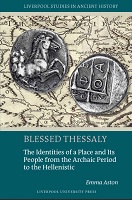Aston, Emma
Thessaly was a region of great importance in the ancient Greek world, possessing both agricultural abundance and a strategic position between north and south. It presents historians with the challenge of seeing beyond traditional stereotypes (wealth and witches, horses and hospitality) that have coloured perceptions of its people from antiquity to the present day. It also presents a complex and illuminating interaction between polis and ethnos identity. In daily life, most Thessalians primarily operated within, and identified with, their specific polis; at the same time, the regional dimension – being Thessalian – was rarely out of sight for long. It manifested itself in stories told, in deities worshipped, in modes of political co-operation, in language, rituals, sites and objects. Chapter by chapter, this book follows the emergence, development and adaptation of Thessalian regional identity from the Archaic period to the early second century BC. In so doing, rather than rejecting ancient stereotypes as a mere inconvenience for the historian, it considers the constant dialogue between Thessalian self-presentation and depictions of the Thessalian character by other Greeks. It also confronts some of the prejudices and assumptions still influencing modern approaches to studying the region. All in all, the reader is invited to see Thessaly not as a region of marginal significance in Greek history, but as occupying a central role in many aspects of ancient cultural and political discourse.
ISBN
9781835530016, 9781789624274Publisher
Liverpool University PressPublisher website
https://www.liverpooluniversitypress.co.uk/Publication date and place
Liverpool, 2024Grantor
Pages
520










 Stumble It!
Stumble It!

No comments:
Post a Comment